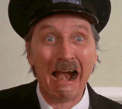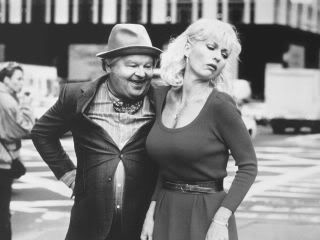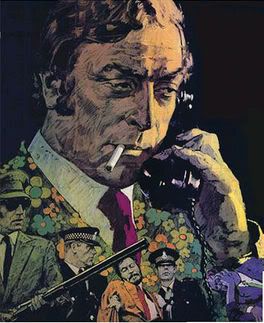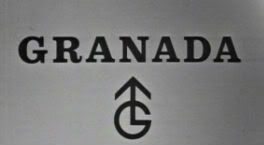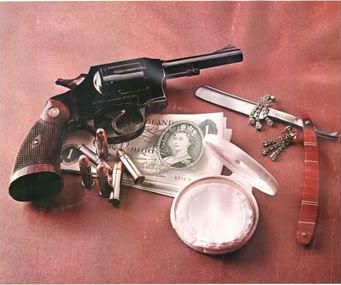“There’s Buses Along Watling Street To London…” Comics! Sometimes they don't half muck you about a bit.
/Nah, don’t get up my account, see I want a word in your shell-like. Don’t flinch, son, I just want to talk to you. Talk to you about this thing what Alan Moore wrote and Kevin O’Neill drew. Won’t take long. We've all got homes to go to. Don’t cry, be a brave soldier. Be over before you know it…
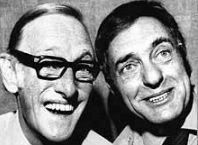
THE LEAGUE OF EXTRAORDINARY GENTLEMEN CENTURY #2 “1969” By Alan Moore(w), Kevin O’Neill(a), Todd Klein(l) and Ben Dimagmaliw(c) Top Shelf/Knockabout Comics $9.95/£7.99 Crikey, mate! Things look proper rum as the psychedelic ‘60s spiral towards a massive downer! Can our enduring chums make everything groovy again!? Don’t freakout, Grandad, the future is sure to be far out!
It's pretty much business as usual in the world of LOEG with the latest installment. A slender plot groaning under an ungainly agglomeration of references and in-jokes, comedy, nastiness and an overriding suspicion that Alan Moore thinks popular culture is going down the crapper. If you liked the last installment you'll like this but if you've been liking them less and less since THE BLACK DOSSIER you're going to like this even less. I'm okay with them myself what with them being well clever and as visually attractive as Valerie Leon in go-go boots.
Alright then, first things first: Is it fan fiction? Yes, I think it is. But I also think you’d be hard pressed to find any genre comic that isn't these days. YMMV. Also, I've never actually looked up a definition of “fan fiction” but we’ll persevere. Crucially what it is is fan fiction of the very highest order. How can it not be fan fiction filled as it is with fictions pulled from other sources and made to dance and warble at the behest of The Magus? At least he has a purpose in mind, at least Alan Moore is using them to some narrative end intended to educate, illuminate and entertain. But then again I could read about the seedy adventures of characters who greatly resemble Jack Carter and Vic Dakin all day.
Oh, It's a grand life with The Magus but it wouldn't be half so grand without his aiders and abettors. Herein Kevin O’Neill is his usual majestically unusual self. Considering the fact that his art already resembles a bad trip the fact that he can actually go further and depict a bad trip is pretty incredible. Kevin O'Neill heroically packs his (mostly) constricted panels with detail and incident that really gives the book a sense of place and it's a place populated by a hectic bustle of humanity. The panels of streets where the shiny future invasively looms over and creeps into the grotty present is done brilliantly. It’s a smart way to convey the way the future arrives. Not in a sudden jump but rather like a tide lapping in and around the present, eroding the shabby terraces and backstreets of now until it was like they were never there. You get a real sense that in ten minutes the future will be all around and it will be as though the future was here all the time.
Todd Klein and Ben Digimagmaliw are afforded a chance to shine and really rise to the challenge. Usually letterers and colourists are just required not to make any mistakes and generally just not get under anyone's feet but given the gift of the psychedelic showdown climax they really go to town. It's lovely, lovely stuff indeed. It's worth buying purely for the visual wizardry on display. Corporate comics aren't ever going to let your eyes graze on such delights as Kevin O'Neill and Co. at full tilt pedal to the mental like this. All the visual artistes do an absolutely smashing job at keeping this thing from sliding into incoherence.
While the whole is unquestionably successful in conveying the shabby reality the '6os briefly disguised and the fact that it may have been a Sexual Revolution but, still, all revolutions have casualties there remains something off about the whole thing. In the early pages in particular Moore’s dialogue reads like raw exposition, which is surprising considering how neatly he captures the “voices” of the supporting cast in the parallel plot. In fact those parts are a far more satisfying read than the adventures of our three primaries. I could have read a lot more about Vic and Jack and a lot less about Mina, ‘Lando and Allan. The gangster stuff had drive and purpose while the League stuff just seemed aimless and repetitive. Maybe the contrast was intentional after all it isn’t the heroes who “save” the day in the end. So caught up are they in their own problems they can barely get it together to be in the right place at the right time. They muck it up good and proper and no mistake.
I get that what Moore’s going for is the whole immortality has its price thing, I get that loud and clear because he never stops bloody banging on about it. Moore makes some good points, some interesting points but he keeps making them without developing them. This doesn't result in a terribly satisfying reading experience but it does at least explain the almost hilarious ineptitude The League displays. Immortality is sure doing a number on our three chums and no mistake. Orlando has his sexual organs growing and receding like a tide of biological confusion, Allan has to carry a monkey around on his back forever and Mina has to cope with the the wounds of her past.
It’s no wonder that at this point they are acting like a bunch of blockheads. Blimey, this lot can’t even save the world properly. Who in their right mind would drop drugs on the cusp of a climactic confrontation upon which they believe the fate of the world to hang? No one. But then these people aren’t in their right mind, so I guess that works. There’s a nice comic pay-off when even the villain appears baffled by their stupidity (“You cretinous CHIT!”) and his plan, which isn't even the plan The League think it is, is only derailed by the actions of a background thug who has no real notion of the events in which he is so pivotal. Which can’t be accidental. I mean, let’s face it, Alan Moore runs a tight ship narratively, if it’s in there it probably means something. What it means is that his is a pretty bleak experience both for the characters and the reader.

Oh, there’s humour in here but not enough to lift it far out of the doldrums. In fact the jokiest joke is the worst joke here. There’s a whole panel wasted here on a Jumping Jack Flash joke that is so leaden I actually resented its hogging of an entire panel. Even the best joke, the one about body swapping (“I’m perplexed.”), is so delightfully nasty it just serves to reinforce the desolation of the book rather than relieve it. Look, the last image in the book is of a sad old man assaulted by the music of the young and angry while slumped on a chair dripping with his own piss. Not exactly Benny Hill is it?
Which, not entirely smoothly, brings me to the most likely cause of upset regarding this here periodical: there’s far too much slapping of little bald men’s heads to the accompaniment of a jaunty tune. No, of course not, but there is quite a lot of sexual violence on these pages. I’d really like to just breeze past that one but sometimes you just have to grasp that nettle. Remember when I used to just make terrible Dad Jokes about bad super hero comics? And Kurt Busiek would patiently correct my blunders? Such happy times! What? I’m not avoiding anything!
Oh, okay… Fair disclosure here, I’m about to give Alan Moore the benefit of the doubt. I have read and enjoyed his work since he poked his young head up in the pages of 2000AD. I guess I am a fan? I’m not uncritical though I try not to be that kind of fan. I mean I love Howard Victor Chaykin to bits but I’m never going to recommend FOREVER MAELSTROM to anyone, okay? Similarly with Alan Moore I didn't buy LOST GIRLS because the page I saw in TCJ had a woman talking about the texture of a bull’s pizzle. Maybe it was a horse, anyway the point is I don’t want to read about beloved children’s characters achieving sexual satisfaction by touching animal’s privates. I’m funny like that. Call me old-fashioned. So while I’m not a hater I guess I’m not a lover but I am a fan. Caveat ends.
So, having thought about it a bit more than I feel I should have had to the nearest I can come to some kind of explanation, some kind of reason for this approach is that Alan Moore is trying to explore some of the connections between sex and violence. I think Alan Moore sees the genre comic’s reliance on violence as unhealthy because it isn't real violence. The power of violence has gone and only empty shock remains. Alan Moore’s work has demonstrated, to me at least, that he understands violence. He knows that violence happens and then keeps right on happening. Violence isn't just the act it’s also the effects of the act. Violence is the original gift that keeps on giving. Any honest depiction of violence should upset you, I think. I could be biased about that. Genre comics don’t deal in honest violence they deal in pantomime violence: safe violence and, thus, fake violence. There are 7o some years of gelding behind every act of violence in genre comics. If you want the violence in your comic to hurt, to be real what to do? It’s this dilemma that leads me to believe Alan Moore is attempting to make violence violent again. And the way I think Alan Moore is attempting to do that is by introducing sex into the equation. Because that's really going to touch a nerve.
That’s what I think and I think that because I know this: practically every act of on-page sex in LOEG:1969 is accompanied, contains or is contrasted with an act of violence. Where conventionally there would only be violence here there is also a sexual element. This is disturbing and upsetting, at least to me. Now, I can only assume (that most dangerous of critical acts) that this is intentional. As I've said the big thing that strikes me about Alan Moore comics is that they have very little room in them for the accidental (or the unintentional). Something as obvious and persistent as the sex/violence link in LOEG:1969 being happenstance seems pretty unlikely. It must have a purpose, it must be intentional. To dismiss it as being merely some kind of accidental twitch of an aged libido or the unconscious seepage of suppressed desires would, I think, be fundamentally wrong at worst and ungenerous at best.
But that leaves me with the puzzle of why Alan Moore goes to such great pains to ensure the reasons for this, the most striking aspect of the work, remain so occluded. Really, I have no recourse but to send comics into the kitchen to help Mother do the dishes while I lean forward to Alan Moore, with his hair brushed and parted, and ask: "But what are your intentions?" And I don't like doing that. If the work has failed to communicate its intentions with regard to an element as pervasive as the sexual violence is in LOEG:C 1969 then the work has failed and failed badly. But not totally.
I have no doubt this is the comic Alan Moore wanted to write but as I'm unsure why that is I have to go with OKAY! Everybody else involved in the visual stuff gets an EXCELLENT!
Now be off with you, I've got to take me Mum her cuppa. What's up with a boy loving his Mum? Tell me that whydoncha? Gwan. Hoppit.


